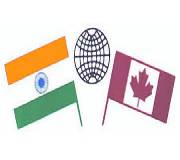
The Canada-India Institutional Cooperation Project (CIICP) is a joint venture by the Association of Canadian Community Colleges and the governments of India and Canada designed to contribute to human resource development in India’s polytechnic system. Specifically, the project seeks to develop replicable models of institutional development in 13 pilot polytechnic institutes in southern India to help make these institutions more responsive to the workforce training needs of local industry, businesses, and communities. The approach to human resource development taken by the project is one of learning by doing, with educators learning planning skills by actually planning project activities. Since implementation in September 1991, improvements within the polytechnics have been noted in the areas of strategic planning, management training, staff development activities, continuing education, industry and community interaction, the participation of women, and environmental education. The success of the partnership is attributed to the CIICP partnership strategy, which is based on building effective relationships, joint implementation, the provision of training for participation in the partnership, and the counterpart approach to the implementation of project activities in which every training session is offered jointly by Canadian and Indian partners. The CIICP has been successful in helping the polytechnics improve the quality of education, provide training relevant to community needs, and generate revenue in their communities. In addition, Canadian colleges have gained important linkages with Indian institutions, opportunities to internationalize their campuses, and vast professional development experiences for faculty.
Changing technology, as well as economic reforms in India, has created a need within Business, Industry and the community for a more highly skillled workforce at the shopfloor level. Persons already on the job also need trainning in new and emerging technologies as well as modern business strategies and production methods. With this perspective in mind, Canada-India Institutional Cooperation Project (CIICP) was launched in 1991 through a Memorandum of Understanding between the Government of India. CIICP involves Canadian Community Colleges, 12 Polytechnics in Southern India, Technical Teacher’s Training Institute (TTTI) Madras and the Indian Society for Technical Education (ISTE).
Karaikal Polytechnic College, Karaikal, an AICTE approved Co-educational institution governed by Pondicherry Institute of Post- Matric and Technical Education (PIPMATE), a Puducherry government sponsored society, offers regular programmes at diploma level in Engineering and Technology to candidates passed 10th and 12th from Puducherry region admitted through a process of selection formulated by the Department of Higher and Technical Education, Government of Puducherry, adopting the curriculum and evaluation methods prescribed by the Directorate of Technical Education, Government of Tamilnadu.
Karaikal Polytechnic College, Karaikal is a pioneer institution offering Diploma in Engineering and Technology to students of Post Secondary level and aims to uplift the community by recognizing the motto “Technology Triumphs”
CIICP believes that people are the key to quality education and to Sustainable Change. Therefore, it focuses on Human Resource Development with special emphasis on skill enhancement in the following areas:
Continuing Education
Industry Institute Interaction
Students Services
Facilities Development
Staff Development
Women in Development
Management Information System
Community Development
Tailoring
Home Appliances Servicing & Wiring
Cell Phone Servicing
Internet and Web Designing
Beautician
Spoken English
Computer Hardware & Servicing
Computer Hardware and Networking Pro
Desktop publishing
TV servicing
Air conditioning and refrigeration
.Net programming
Computer Graphics & Animation
French
Yoga
Drawing & Painting(School children)
Art & craft (School children)
Variety paintings(School children)
A large number of successful Continuing Education Programmes relevant to the needs and satisfaction of the participants.
Close linkages and relationships developed between the polytechnics, industry, community and NGOs.
Enhanced expectations of industry training from the polytechnics.
| Sl.No | Name of the Course | Duration | Qualification |
|---|---|---|---|
1 |
Refrigeration & Air Conditioning |
2 |
S.S.L.C |
2 |
Spoken Hindi |
2 |
NIL |
3 |
Basic French |
2 |
S.S.L.C |
4 |
Desktop Publishing |
2 |
S.S.L.C |
5 |
Fitter |
2 |
NIL |
6 |
Welder |
2 |
NIL |
7 |
Business Processing Office |
2 |
S.S.L.C |
8 |
Electrician |
2 |
S.S.L.C |
9 |
Turner |
2 |
NIL |
10 |
Basic Electronics |
2 |
S.S.L.C |
11 |
Tailoring |
2 |
NIL |
12 |
Home Appliances Servicing & Wiring |
2 |
S.S.L.C |
13 |
Cell Phone Servicing |
2 |
S.S.L.C |
14 |
MS Office Automation & Internet |
2 |
S.S.L.C |
15 |
Internet & Web Designing |
2 |
S.S.L.C |
16 |
TV Servicing |
2 |
S.S.L.C |
17 |
Computer Hardware and Network |
2 |
S.S.L.C |
18 |
Spoken English |
2 |
S.S.L.C |
19 |
Beautician |
2 |
NIL |
20 |
Visual Basic 6.0 |
2 |
S.S.L.C |
21 |
Java Programming |
2 |
S.S.L.C |
22 |
.Net programming |
2 |
S.S.L.C |
23 |
Oracle with Java |
2 |
S.S.L.C |
24 |
Hardware & Networking Pro |
2 |
S.S.L.C |
25 |
Website Designing |
2 |
S.S.L.C |
26 |
Computer Graphics & Animation |
2 |
S.S.L.C |
27 |
CATIA |
2 |
S.S.L.C |
28 |
Oracle with VB |
2 |
S.S.L.C |



